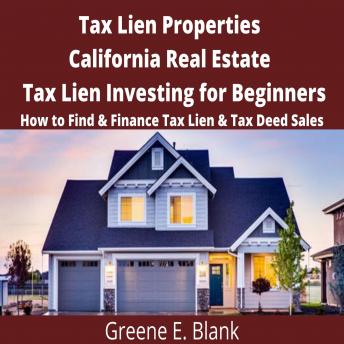All Categories
Featured
Table of Contents
Tax lien investing can offer your profile exposure to property all without having to actually possess building. Experts, however, claim the process is made complex and alert that beginner financiers can quickly obtain burned. Right here's whatever you need to learn about buying a tax lien certificate, including just how it works and the risks involved.
The notification normally comes before harsher actions, such as a tax obligation levy, where the Irs (IRS) or regional or community governments can actually confiscate a person's building to recover the debt. A tax lien certification is developed when a homeowner has failed to pay their taxes and the city government problems a tax obligation lien.
Tax obligation lien certifications are typically auctioned off to financiers aiming to revenue. To recoup the delinquent tax bucks, communities can then offer the tax lien certificate to exclusive investors, that take care of the tax expense in exchange for the right to accumulate that cash, plus interest, from the homeowner when they eventually repay their balance.
Tax Lien And Tax Deed Investing
permit the transfer or assignment of delinquent genuine estate tax liens to the economic sector, according to the National Tax Obligation Lien Organization, a nonprofit that stands for governments, institutional tax lien financiers and servicers. Here's what the process appears like. Tax lien investors have to bid for the certificate in an auction, and exactly how that process functions relies on the particular district.
Get in touch with tax obligation officials in your area to make inquiries just how those overdue taxes are accumulated. Auctions can be on the internet or personally. Occasionally winning bids most likely to the financier ready to pay the most affordable rate of interest, in a technique understood as "bidding down the rate of interest." The district establishes an optimum rate, and the bidder supplying the cheapest rates of interest below that optimum wins the public auction.
Other winning proposals go to those who pay the highest possible money amount, or costs, over the lien amount. What occurs following for investors isn't something that occurs on a stock market. The winning prospective buyer needs to pay the entire tax obligation bill, including the overdue financial debt, interest and charges. The investor has to wait until the building proprietors pay back their entire balance unless they don't.
While some capitalists can be awarded, others could be captured in the crossfire of challenging guidelines and technicalities, which in the most awful of conditions can cause large losses. From a simple profit standpoint, a lot of investors make their cash based on the tax lien's rate of interest rate. Rates of interest vary and depend upon the territory or the state.
Profits, nonetheless, do not always amount to returns that high during the bidding procedure. In the long run, a lot of tax obligation liens bought at public auction are cost rates between 3 percent and 7 percent nationally, according to Brad Westover, executive director of the National Tax Obligation Lien Organization. Prior to retiring, Richard Rampell, formerly the chief exec of Rampell & Rampell, an accounting company in Palm Coastline, Florida, experienced this firsthand.
Tax Lien Investment Companies
After that large institutional capitalists, including banks, hedge funds and pension funds, chased after those greater returns in public auctions around the country. The bigger investors assisted bid down rate of interest rates, so Rampell's group wasn't making significant money anymore on liens.
That seldom occurs: The tax obligations are usually paid prior to the redemption date. Liens also are first in line for settlement, also before home mortgages. However, tax obligation liens have an expiry day, and a lienholder's right to seize on the property or to collect their financial investment runs out at the exact same time as the lien.
Private investors that are thinking about financial investments in tax liens should, above all, do their research. Experts recommend preventing residential or commercial properties with ecological damages, such as one where a gas station discarded unsafe material.
Tax Lien Investments
"You ought to truly comprehend what you're getting," claims Richard Zimmerman, a partner at Berdon LLP, an accountancy company in New york city City. "Be aware of what the home is, the community and values, so you do not acquire a lien that you will not be able to accumulate." Would-be capitalists need to also have a look at the residential property and all liens versus it, in addition to current tax obligation sales and sale rates of comparable homes.
Yet, maintain in mind that the details you find can usually be dated. "Individuals get a listing of buildings and do their due diligence weeks prior to a sale," Musa says. "Fifty percent the properties on the checklist might be gone due to the fact that the taxes earn money. You're wasting your time. The closer to the day you do your due diligence, the far better.
Tax Lien Investing Kit

Westover claims 80 percent of tax lien certifications are offered to members of the NTLA, and the company can commonly compare NTLA participants with the best institutional investors. That could make handling the procedure much easier, especially for a novice. While tax lien financial investments can use a charitable return, be mindful of the small print, information and regulations.
"Yet it's complicated. You need to recognize the details." Bankrate's added to an upgrade of this story.
Building tax obligation liens are an investment particular niche that is overlooked by the majority of investors. Getting tax obligation liens can be a profitable though relatively dangerous service for those that are well-informed about genuine estate. When people or organizations fall short to pay their residential or commercial property taxes, the municipalities or other federal government bodies that are owed those tax obligations put liens against the buildings.
Tax Lien Investing Risks
These insurance claims on collateral are also traded among investors that intend to generate above-average returns. Via this procedure, the district obtains its tax obligations and the investor obtains the right to collect the quantity due plus interest from the debtor. The process seldom ends with the capitalist seizing possession of the residential property.
If you need to confiscate, there might be various other liens versus the residential property that maintain you from taking property. You can likewise spend indirectly using home lien funds.
It properly ties up the residential or commercial property and prevents its sale till the owner pays the taxes owed or the residential property is confiscated by the lender. For instance, when a landowner or home owner falls short to pay the tax obligations on their property, the city or region in which the home is located has the authority to place a lien on the property.
Property with a lien affixed to it can not be sold or re-financed up until the tax obligations are paid and the lien is eliminated. When a lien is issued, a tax obligation lien certificate is developed by the district that shows the amount owed on the residential or commercial property plus any type of rate of interest or fines due.

It's approximated that an extra $328 billion of property tax obligations was examined throughout the United state in 2021. It's tough to analyze across the country property tax lien numbers.
Latest Posts
Government Tax Foreclosure
Tax Houses For Sale Near Me
Investing In Tax Liens Online